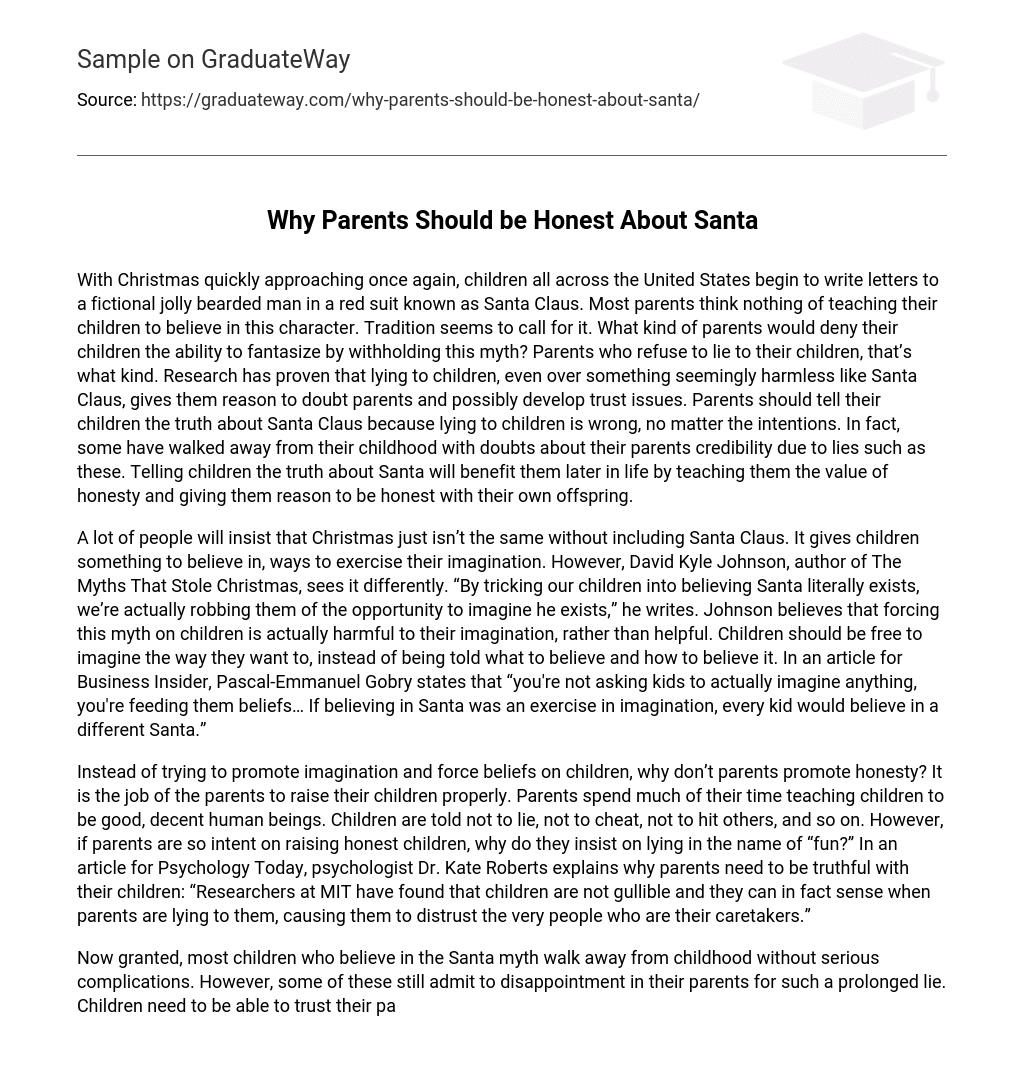With Christmas quickly approaching once again, children all across the United States begin to write letters to a fictional jolly bearded man in a red suit known as Santa Claus. Most parents think nothing of teaching their children to believe in this character. Tradition seems to call for it. What kind of parents would deny their children the ability to fantasize by withholding this myth? Parents who refuse to lie to their children, that’s what kind. Research has proven that lying to children, even over something seemingly harmless like Santa Claus, gives them reason to doubt parents and possibly develop trust issues. Parents should tell their children the truth about Santa Claus because lying to children is wrong, no matter the intentions. In fact, some have walked away from their childhood with doubts about their parents credibility due to lies such as these. Telling children the truth about Santa will benefit them later in life by teaching them the value of honesty and giving them reason to be honest with their own offspring.
A lot of people will insist that Christmas just isn’t the same without including Santa Claus. It gives children something to believe in, ways to exercise their imagination. However, David Kyle Johnson, author of The Myths That Stole Christmas, sees it differently. “By tricking our children into believing Santa literally exists, we’re actually robbing them of the opportunity to imagine he exists,” he writes. Johnson believes that forcing this myth on children is actually harmful to their imagination, rather than helpful. Children should be free to imagine the way they want to, instead of being told what to believe and how to believe it. In an article for Business Insider, Pascal-Emmanuel Gobry states that “you’re not asking kids to actually imagine anything, you’re feeding them beliefs… If believing in Santa was an exercise in imagination, every kid would believe in a different Santa.”
Instead of trying to promote imagination and force beliefs on children, why don’t parents promote honesty? It is the job of the parents to raise their children properly. Parents spend much of their time teaching children to be good, decent human beings. Children are told not to lie, not to cheat, not to hit others, and so on. However, if parents are so intent on raising honest children, why do they insist on lying in the name of “fun?” In an article for Psychology Today, psychologist Dr. Kate Roberts explains why parents need to be truthful with their children: “Researchers at MIT have found that children are not gullible and they can in fact sense when parents are lying to them, causing them to distrust the very people who are their caretakers.”
Now granted, most children who believe in the Santa myth walk away from childhood without serious complications. However, some of these still admit to disappointment in their parents for such a prolonged lie. Children need to be able to trust their parents. Christopher Boyle, a psychologist and professor at the University of Exeter, suggests that ‘[the] morality of making children believe in such myths has to be questioned. All children will eventually find out they’ve been consistently lied to for years, and this might make them wonder what other lies they’ve been told.” Telling children about Santa, a seemingly harmless little white lie, could actually lead to problems with trusting parents about other things, such as religion. Quoting from The Lancet Psychiatry, Vocativ writer Alexandra Ossola poses a question children might ask: “If adults have been lying about Santa, even though it has usually been well intentioned, what else is a lie? If Santa isn’t real, are fairies real? Is magic? Is God?” In this way, parents who intend to let their children enjoy the “magic of Christmas,” may instead end up adversely affecting them for life.
Another issue with the lie of Santa Claus is that many parents may not be doing it for the child’s benefit at all. Referring back to Lancet Psychiatry, Alexandra Ossla states that “[the] authors of the current study say it’s mostly about the parents wanting to themselves return to the days of optimism, when they believed that the world was magical.” And according to David Kyle Johnson, “[a] primary function of the lie is to keep children from misbehaving.” Parents may threaten that no gifts will be received if the children continue to disobey. Not all parents are guilty of such behavior, but a good many do participate. Johnson then adds that “[even] defender of the Santa-lie Melinda Moyer agrees that Santa shouldn’t be used as a disciplinary threat. ‘Though lying [about Santa] can be an awfully convenient parenting crutch… it’s generally best to keep it to a minimum, both to develop trust… and to lead by example.’” However, even keeping lying to a minimum can still hurt the trust between parent and child. In Business Insider, Gobry suggests that parents should not lie to their children at all, stating that “[the] argument goes something like this: lying to children is bad.” Parents need to be honest with their children if they want their children to trust them. It is hard to build a trusting relationship if either member is continually lying to the other.
In conclusion, parents have to make many choices in raising their children. Some of these choices come into play around Christmas time. Follow the crowd, or tell the truth? The evidence points towards the latter. Children deserve honesty from their parents, and from those they trust. Just as Benjamin Franklin said, “Honesty is the best policy,” even about something like Santa Claus.





